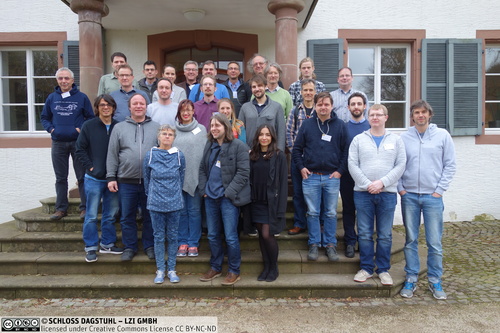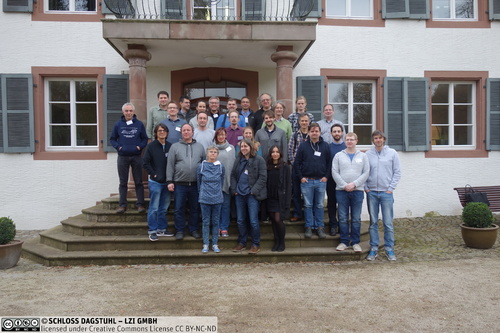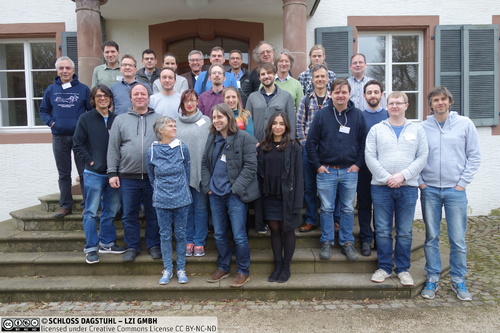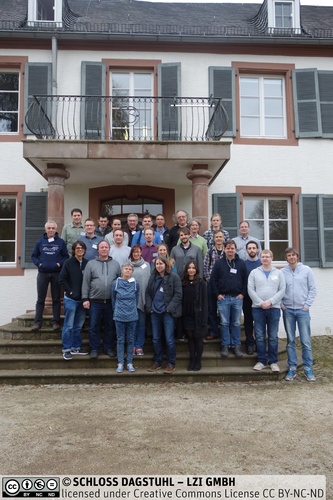Dagstuhl-Seminar 17452
Algorithmic Cheminformatics
( 05. Nov – 10. Nov, 2017 )
Permalink
Organisatoren
- Jakob Lykke Andersen (Tokyo Institute of Technology, JP)
- Christoph Flamm (Universität Wien, AT)
- Daniel Merkle (University of Southern Denmark - Odense, DK)
- Peter F. Stadler (Universität Leipzig, DE)
Kontakt
- Michael Gerke (für wissenschaftliche Fragen)
- Annette Beyer (für administrative Fragen)
Cheminformatics is the application of algorithms, combinatorial approaches, and formal methods from computer science to problems in chemistry. Although cheminformatics is an old research field and has thrived with the advances e.g. in machine learning techniques, it has drawn little from the rapid development of state-of-the-art theoretical computer science. The advance of the theoretical foundations of many aspects of cheminformatics on the basis of theoretical computer science is a sorely needed research endeavor that will serve to integrate ad hoc approaches motivated by chemical insight into coherent computational and algorithmic frameworks.
At the first Dagstuhl Seminar "Algorithmic Cheminformatics" in 2014 a wide range of topics were discussed in order to underline the significance of computer science for chemistry. Aiming at a triennial seminar series, we bring together researchers working in chemistry, cheminformatics, and most importantly the relevant fields in computer science related to it.
At this event, we specifically focus on the analysis of the behavior of chemical systems in terms of reaction networks. This includes both networks inferred from experimental data, as well as networks implicitly specified by for example formal grammars. We aim at integrating experts in concurrency theory, in particular using process calculi, Petri nets, and related formal approaches. State-of-the-art results in these fields are hardly used to infer qualitative and/or quantitative properties of chemical reaction systems, which are highly concurrent systems by nature. The majority of current modeling approaches in chemistry are either very abstract and aimed at formal algebraic properties of reaction networks, or use very fine grained modeling on the level of quantum mechanics where computational costs prevent handling of reaction systems larger than a few molecules. We therefore seek to advance discrete modeling approaches for Systems Chemistry including the notion of causality and concurrency. In addition to bringing together the experts in the respective fields from computer science, we will intentionally also invite wet-lab chemists in order to cross-fertilize the fields and generate mutually beneficial activities.
 Jakob Lykke Andersen, Christoph Flamm, Daniel Merkle, and Peter F. Stadler
Jakob Lykke Andersen, Christoph Flamm, Daniel Merkle, and Peter F. Stadler
Cheminformatics is the application of algorithms, combinatorial approaches, and formal methods from Computer Science to problems in Chemistry. While being formally a very old research field, building the theoretical foundations for Cheminformatics seen from the perspective of state-of-the-art theoretical Computer Science is not at all established research. The second edition of the seminar on ``Algorithmic Cheminformatics'' brought together researchers working in Chemistry, Cheminformatics, and most importantly the relevant fields in Computer Science related to it. In contrast to the first Dagstuhl meeting in 2014, we specifically focused on the analysis of the behaviour of chemical systems in terms of reaction networks. This includes both networks inferred from experimental data, as well as networks implicitly specified by for example formal grammars. We integrated experts in concurrency theory, in particular using process calculi, Petri nets, and related formal approaches. State-of-the-art results in these fields are hardly used to infer qualitative and/or quantitative properties of chemical reaction systems, which are highly concurrent systems by nature. Most current modeling approaches in chemistry are either very abstract and aimed at formal algebraic properties of reaction networks, or use precise modeling on a very fine grained level such as the quantum mechanical one where computational costs prevent handling of more than a few molecules. In this seminar we therefore seeked to advance discrete modeling approaches for Systems Chemistry. In addition to bringing together the experts in the respective fields from Computer Science, we also invited wet-lab chemists in order to cross-fertilize the fields and generate mutually beneficial activities.
 Jakob Lykke Andersen, Christoph Flamm, Daniel Merkle, and Peter F. Stadler
Jakob Lykke Andersen, Christoph Flamm, Daniel Merkle, and Peter F. Stadler
- Jakob Lykke Andersen (Tokyo Institute of Technology, JP) [dblp]
- Sarah Berkemer (MPI für Mathematik in den Naturwissenschaften, DE) [dblp]
- Mary Ann Blätke (IPK Gatersleben, DE) [dblp]
- Erick Chastain (Rutgers University - Piscataway, US) [dblp]
- Cinzia Di Giusto (Laboratoire I3S - Sophia Antipolis, FR) [dblp]
- Peter Dittrich (Universität Jena, DE) [dblp]
- Mark Dörr (Universität Greifswald, DE) [dblp]
- Rolf Fagerberg (University of Southern Denmark - Odense, DK) [dblp]
- Harold Fellermann (University of Newcastle, GB) [dblp]
- Jérôme Feret (ENS - Paris, FR) [dblp]
- Christoph Flamm (Universität Wien, AT) [dblp]
- Walter Fontana (Harvard Medical School - Boston, US) [dblp]
- David Gilbert (Brunel University - Uxbridge, GB) [dblp]
- Monika Heiner (BTU Cottbus, DE) [dblp]
- Marc Hellmuth (Universität Greifswald, DE) [dblp]
- Wim Hordijk (Konrad Lorenz Institut - Klosterneuburg, AT) [dblp]
- Rojin Kianian (University of Southern Denmark - Odense, DK)
- Daniel Merkle (University of Southern Denmark - Odense, DK) [dblp]
- Markus E. Nebel (Universität Bielefeld, DE) [dblp]
- Nikolai Nøjgaard (Universität Greifswald, DE) [dblp]
- Marco Peressotti (University of Southern Denmark - Odense, DK) [dblp]
- Guillermo Restrepo (Universität Leipzig, DE) [dblp]
- Heinz W. Schmidt (RMIT University - Melbourne, AU) [dblp]
- D. Eric Smith (Santa Fe Institute, US) [dblp]
- Peter F. Stadler (Universität Leipzig, DE) [dblp]
- Mirco Tribastone (IMT - Lucca, IT) [dblp]
- Klaus-Peter Zauner (University of Southampton, GB) [dblp]
Verwandte Seminare
- Dagstuhl-Seminar 14452: Algorithmic Cheminformatics (2014-11-02 - 2014-11-07) (Details)
Klassifikation
- networks
- semantics / formal methods
Schlagworte
- process algebras
- petri nets
- concurrency theory
- graph transformation
- reaction networks





 Creative Commons BY 3.0 DE
Creative Commons BY 3.0 DE
